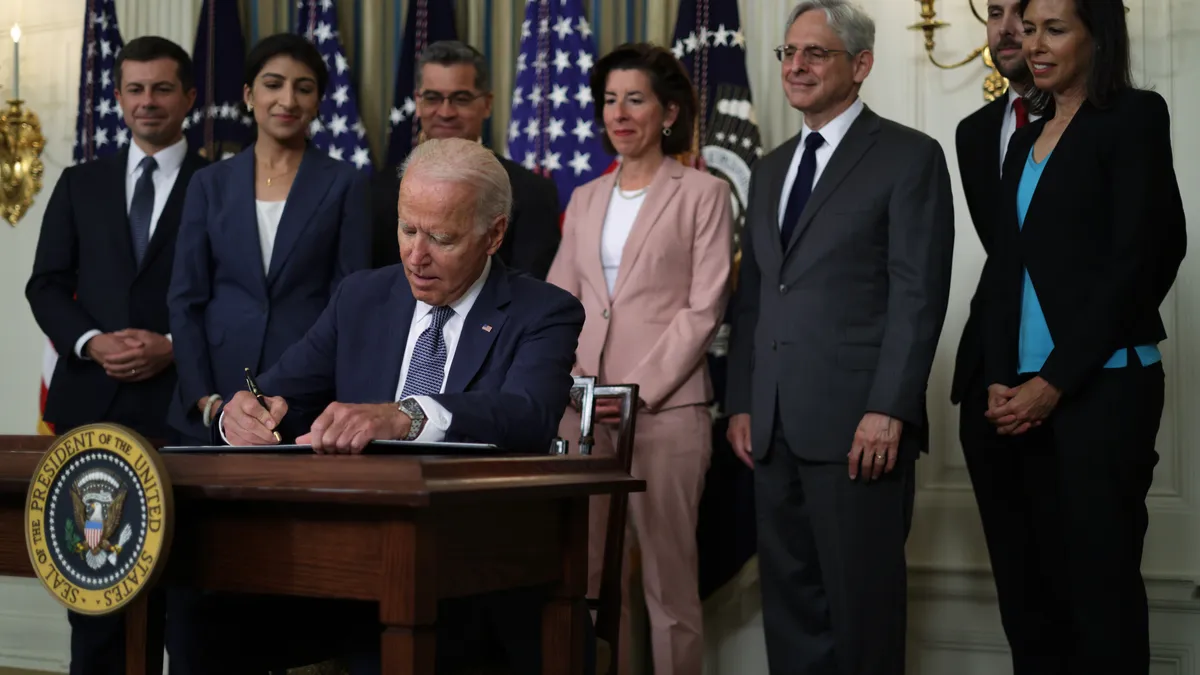Dive Brief:
- The U.S. Chamber of Commerce is asking a federal district court in Texas to stop the Federal Trade Commission from enforcing the nationwide ban on noncompete agreements that it enacted Tuesday on the grounds the agency is exceeding its authority.
- “Congress has never empowered the Commission with general rulemaking authority regarding matters under its jurisdiction,” the organization says in its April 24 complaint. “Even if the Commission had any authority to issue substantive regulations proscribing ‘unfair methods of competition,’ the Noncompete Rule would still be unlawful because noncompete agreements are not categorically unlawful under Section 5” of the FTC Act. Section 5 prohibits unfair trade practices.
- The rule, which passed on a 3-2 vote, is scheduled to take effect in the fall and would require employers to rescind all noncompete agreements in force, except those covering senior executives, and make the use of noncompetes going forward illegal, including those for senior executives. Other types of agreements would also be illegal to the extent they function as noncompetes.
Dive Insight:
States and the federal government have stepped up enforcement of noncompetes in recent years as companies have become more aggressive in using them.
About a fifth of workers in the United States are subject to them, including lower-level workers like those earning minimum wage at fast food restaurants who have increasingly become subject to them. The agreements have traditionally been used for executive-level employees who have access to sensitive information or specialized expertise that could pose a competitive threat to a company when they leave.
The Chamber says the agency has authority under Sec. 5 of the FTC Act to regulate unfair practices, which historically has meant taking enforcement actions against companies on a case-by-case basis, and under Sec. 6 to issue rules in support of that authority.
But Congress has never given the agency authority to issue the kind of sweeping regulation that the noncompete ban represents.
“At no point during Congress’s deliberations … did the House or the Senate even suggest that the newly formed Commission would have substantive rulemaking authority over the entire economy — a proposition that would have been unheard of in 1914,” when the FTC Act was passed, the Chamber says.
The FTC only started taking the view that its authority under Sec. 6 extends to sweeping, substantive rulemaking after President Biden made unfair competition a focus of his administration. “The Commission now claims that the ministerial authority provided by Section 6 of the FTC Act empowers it to issue any rule it deems necessary,” the Chamber says.
The federal government is inserting itself in an area that has historically been handled by the states, the Chamber says. “Each State has developed its own body of law to determine when noncompete agreements are enforceable, and when they go too far.”
In its rush to give Biden what he wants, the Chamber suggests, the FTC has been slipshod in how it’s documented the need for the ban. Instead of doing the kind of research that such a sweeping rule requires, the agency is “relying on a series of studies that examined the economic effects of much narrower regulations and that suffered from a variety of limitations and flaws — all of which the Commission ignored.”
The lawsuit is asking the court to vacate the rule and to enjoin enforcement on the grounds the agency doesn’t have substantive rulemaking authority under the Administrative Procedures Act and that the designation of all noncompete agreements as an unfair method of competition exceeds the agency’s authority under Sec. 5 of the FTC Act. The agency also doesn’t have the authority to issue rules that apply retroactively, as this one does, and it failed to engage in reasoned decision making when it passed the rule. It also disregarded alternative proposals to a full ban.











